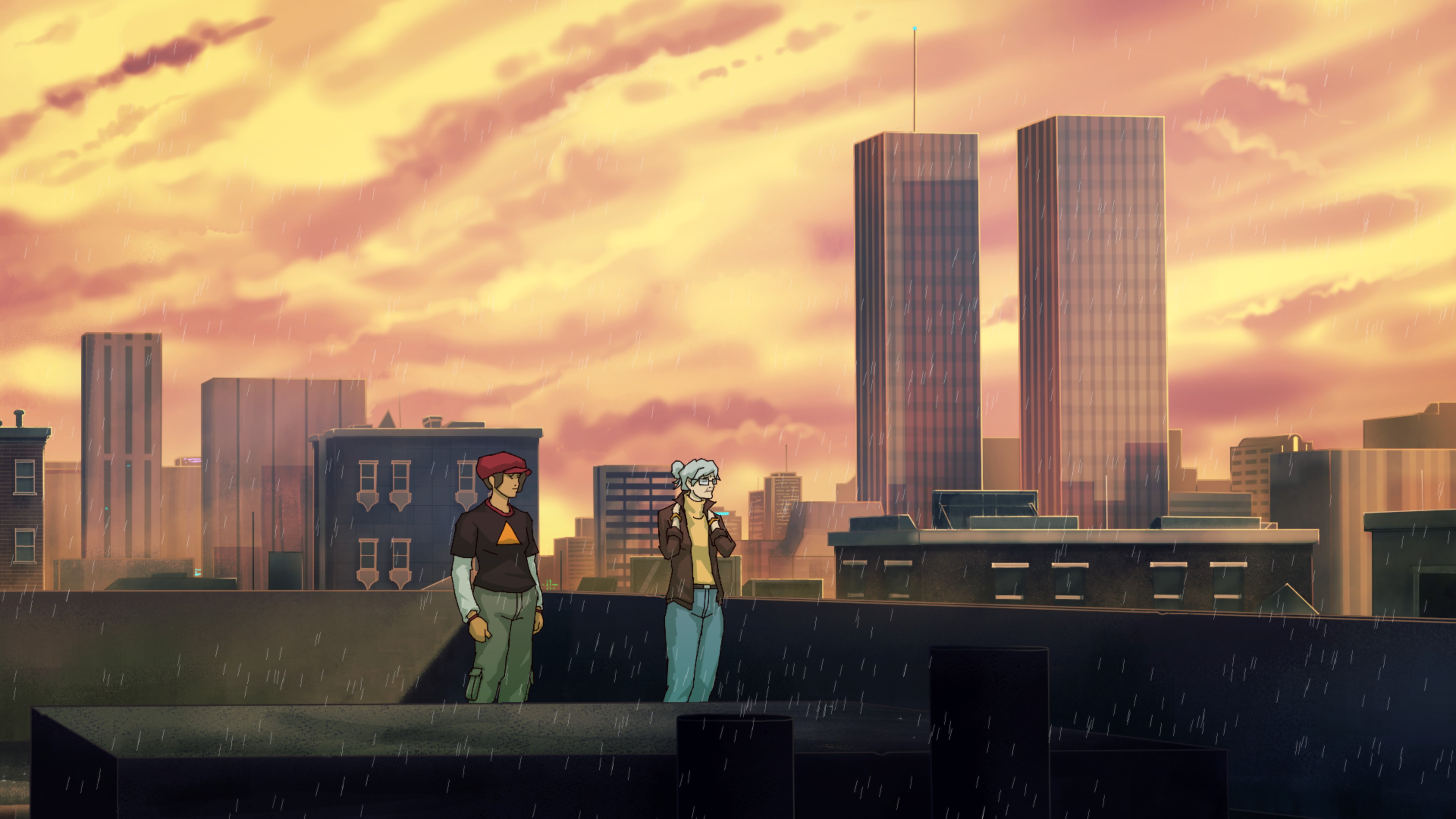The First Ten Minutes

Every week, Richard Cobbett looks at the world of story and writing in games.
There's a great rule for novel and other fiction writing; kill your first chapter. That's where you tend to get long-winded introductions, forced character descriptions, and most importantly, a slow wind-up to the point where the story actually starts. Sadly, games tend not to have editors with the +2 Machete of Good Pacing required to get it to the bloody point, while too many developers still adopt a frustrating "You've bought it, you'll play it" approach to their openings. So! Here's a handy guide to seven of the most common opening mistakes that only exists to waste everyone's time. No, no, please. You're welcome.
The Lore Dump
Aeons ago, there were dragons and wise kings and they fought because that is what happens. And nobody cares. Even if they do care, nobody remembers this crap years later. There is no worse sign for an intro than a leather-bound book on a table with the game's logo on it, slowly opening up while a narrator earns their pay cheque. Where lore is important, the place for it is in the actual game itself, brought up as and when is necessary and ideally told in less pointed form. Case in point, this intro for Might and Magic X. Absolutely none of this ponderous shit is remotely relevant until a point where it's long since been forgotten and just has to be gone over again. It's not until 3:10 of 3:51 that the actual game's story begins, and even then it's just "So, this peninsula is in trouble." The actual player characters don't come in until 3:30, and get just 10 seconds of time - time that states they come to fulfil their mentor's dying wish, but not even what that dying wish is. Aaargh! Then when you get in the game, it's "Deliver their ashes."
This is a very, very pretty intro. It's also entirely worthless.
Journey To Where The Game Starts
Another frustratingly persistent RPG trope. As with all games, there needs to be time to explain how things work and set up the characters, and that's fine. However, all of that can be worked into the story itself and presented in a more relevant form than your party having to bumble around for a bit until they actually get the quest. Everyone knows what that's going to be, it's probably on the box (or these days, in the Steam description or whatever). Cut to the meat! The easiest way of doing this is to join the story in medias res, as in Shadowrun Dragonfall or The Witcher 2 where we join in the middle of a mission that can set things up, or something like Skyrim and Dragon Age Inqusition where the player and character alike are thrust into a difficult situation and have to deal with it on the fly. There's plenty of time to stop and sniff the flowers once a story begins, but if it doesn't start at one of the most important moments in the character's life, it's likely starting early. The only real exception is if the character's life is inherently interesting. A pirate for instance doesn't have to be scoring the treasure of a lifetime, but nor should they be sleeping in their cabin.
The usual argument against this is the need to build up a sense of connection and security before pulling it away, but that just doesn't wash any more. We all know that the sleepy little fantasy village where the hero milks cows for their family or whatever is going to be a pack of firelighters, that the loving parents have a life expectancy measured in tutorial steps. Get to the game, or get out.
The biggest gaming news, reviews and hardware deals
Keep up to date with the most important stories and the best deals, as picked by the PC Gamer team.
Locked In A Room
This is something of an adventure trope, where the hero will find themselves trapped in a single location until they've found everything that they need to proceed. Typically, it's a crime scene or similar, where everyone's psychic intuition will tell them when you're done. These are sometimes necessary evils in the genre, and yes, fine, but ideally a game will begin with something more dramatic and interesting. Instead of a cut-scene where we see someone being killed for instance, flip perspective so that we play the victim for a while. Or something. Anything. Everything is more interesting when it's interactive, or at least has a heavy interactive element to it rather than just being a cut-scene. Which brings us to...
The Tutorial/Drama Clash
Tutorials are inherently pretty dull things, and so a lot of the time developers will get them out of the way as early as possible. The problem is that doing so usually drives a spike into the drama's head, slowing it down when it should be hitting hard and setting up the story. To some extent this is often unavoidable. If the player doesn't know how to walk, then they're not going to get very far. It's easy to simply shrug this off and assume everyone will, but it's not always true. One of my favourite game developer stories about this comes from Dave Gilbert of Wadjet Eye Games, who created a casual adventure game called Emerald City Confidential. The first scene involves the main character, Petra, breaking into a warehouse while on the trail of a suspect, and the puzzle is simply 'pick up crowbar, use crowbar on door'. Easy, yes? Well, unless you're the tester who couldn't solve it. It wasn't that they missed the idea, it was that they saw Petra as another puzzle piece on the screen and couldn't work out why 'give the girl the crowbar to open the door' wouldn't work. Logically, you can't argue with that!
For the most part though, intro scenes shouldn't get bogged down with tutorials. They bore more experienced players and overload less experienced ones. Case in point, Phoenix Online's Cognition. This isn't a particularly egregious case by any means, just one that springs to mind where streamlining would have helped. The main character is on the trail of a serial killer in a cemetery, in a frantic state of mind. That's not the state of mind with which one goes around examining footprints and picking up shovels and gathering puzzle pieces. The whole scene is generally very well made, with her having to submit to torturous pain to proceed and having a dramatic encounter with her nemesis... but in trying to serve two masters and have adventure game puzzles where they're simply not needed or helpful, the pace gets it in the knees too. There's plenty of time when things quieten down to go "And now, inventory items."
Non-Interactive Interactive Cutscenes
Half-Life's opening tram ride was amazing in 1998.
It is not 1998 any more. And in particular, any scenes like being aboard a helicopter where you can't even see out are now to be punishable with a head-dunking into the sewer level. Oh, and while we're on the subject:
Awesome Intro Turns Out To Be Dream And/Or Simulator
Die in a fire. There is no more self-defeating opening than taking a moment of awesomeness, pulling the rug out from under the player and going "Haha, only joking."
Long Term Goals, Short Term Goals
This one tends to be less of a problem for RPGs, which have a long history of quest trackers and other such assistants. Other genres though, particularly adventures, have an annoying tendency of having a cool vignette opening to set the mood and then just start flapping around until something else happens. Again, this ties into the "everyone knows what the basic story is" problem - if our hero is going to be transported from their boring life, we don't need too much messing around in the mundane. The fact that it IS their boring life should be a clue that we don't want to spend too much time in it.
Dreamfall Chapters is a pretty good idea of a game struggling here, despite otherwise being really cool. When you start, you get this mysterious and cryptic dream world in which heroine Zoe Castillo saves dreamers trapped in another world, only to wake up and then... what? She has short term goals, like buying her boyfriend lunch and helping her boss look after a robot, but the only lingering sense of there being a big picture is knowing on a meta level that there is one. Instead we get a lot of talk about the nature of reality, in a thinly veiled 'story so far', and then Stuff Just Happens. It's particularly notable with it being the third part of the story, and so we know for a cast-iron fact that the magic world and conspiracies are all going on while we mess about.
The difference between Dreamfall and many is that it has the character and charisma to get away with it. Far too many simply drop the player into a world and shrug - there's stuff to do, so go do stuff. The goal is usually to make the player feel free to explore, and that can work in an open world like Skyrim where the main quest is of tertiary importance anyway. Far too often though, it feels like being abandoned. The detective goes from the crime scene to sit around at home, or hang out in a bar. The villain escapes, and suddenly there's nothing to do but seemingly random tasks to advance the plot. Grand Theft Auto IV is a huge offender here, albeit a bit later than most games, with its story simply deflating after the first island.
That's just a few of the ways that games regularly screw the landing. Are there any others that routinely make you grind your teeth down to dust?

